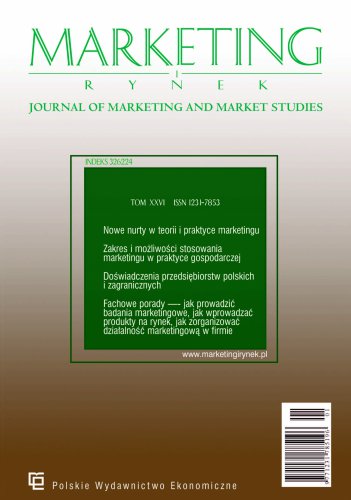Bio-packaging supply chains in circular economy — research concept
The aim of the article is to present the development of bio-packaging supply chains as a market trend towards meeting the principles of the circular economy (CE) and the concept of research focused on it. The authors explain the need to undertake and constantly deepen cooperation of stakeholders in creating social innovations, necessary to design circular supply chains of bio-packaging to meet CE principles. They open the perspective of research on the conditions and significance of the development of biopackaging market and closed loop to contribute to the achievements of life sciences by presenting results and conclusions in the background of social sciences. The concept of their research has also application values, as it integrates stakeholders from private and public sectors in the pursuit of creating and implementing innovations.
References
Bibliografia/References
Bukowski, M. i Śniegocki, A. (2017). Megatrendy od akceptacji do działań. WiseEuropa — Fundacja Warszawski Instytut Studiów Ekonomicznych i Europejskich. Warszawa.
Chardoul, N., O'Brien, K., Clawson, B. i Flechter, M. (2015). Compost Operator Guidebook. Best Management Practices for Commercial Scale Composting Operations. March.
COM (2013). Zielona Księga w sprawie europejskiej strategii dotyczącej odpadów z tworzyw sztucznych w środowisku. Bruksela: Komisja Europejska.
COM (2018). Europejska strategia na rzecz tworzyw sztucznych w gospodarce o obiegu zamkniętym. Komunikat Komisji do Parlamentu Europejskiego, Rady, Europejskiego Komitetu Ekonomiczno-Społecznego i Komitetu Regionów. Bruksela: Komisja Europejska.
Department for Environment, Food and Rural Affairs (2010). Bioplastics: Assessing their environmental effects, barriers & opportunities. Valpak Consulting Consortium. Queen's Printer and Controller of HMSO.
Diaz, L. F., Savage, G. M. i Golueke, C. G. (2002). Composting of municipal solid wastes. Handbook of solid waste management. W: G. Tchobanoglous i F. Kreith (red.), Handbook of solid waste management (423–492). McGraw-Hill.
European Bioplastics (2018). What are bioplastics? Fact sheet. https://docs.european-bioplastics.org/publications/fs/EuBP_FS_What_are_bioplastics.pdf (17.02.2021)
European Commission (2015). COM (2015) 614 final, Closing the loop — An EU action plan for the Circular Economy. https://eur-lex.europa.eu/legalcontent/EN/TXT/?uri=CELEX%3A52015DC0614 (17.02.2021).
European Commission (2020). COM/2020/98 final, A new Circular Economy Action Plan For a cleaner and more competitive Europe. Brussels. https://eur-lex.europa.eu/legal-content/EN/TXT/? qid=1583933814386&uri=COM:2020:98:FIN (17.02.2021).
European Environment Agency (2016). Circular economy in Europe Developing the knowledge base. Luxembourg. https://www.eea.europa.eu/publications/circular-economy-in-europe (17.02.2021).
Farooque, M., Zhang, A., Thurer, M., Qu, T. i Huising, D. (2019). Circular supply chain management: A definition and structured literature review. Journal of Cleaner Production, 228, 882–900. https://doi.org/10.1016/j.jclepro. 2019.04.303
Foltynowicz, Z. (2020). Polymer packaging materials — friend or foe of the Circular Economy. Polimery, 65, 3–7. https://doi.org/10.14314/polimery.2020.1.1
Fundacja Ellen McArthur (2015). Ku gospodarce o obiegu zamkniętym: biznesowe uzasadnienie przyspieszonej zmiany. https://www.ellenmacarthurfoundation.org/assets/downloads/PL-Towards-a-Circular-Economy-Business-Rationale-for-an-Accelerated-Transition-v.1.5.1.pdf (03.11.2020).
Guide, V. D. R, i Van Wassenhove, L. N. (2006). Closed-loop supply chains: an introduction to the feature issue (Part 1). Production and Operations Management, 15(3), 345–350. https://doi.org/10.1111/j.1937-5956.2006.tb00249.x
Jałowiec, T. (2011). Towaroznawstwo dla logistyki. Wybrane problemy. Warszawa: Difin.
Kirchherr, J., Reike, D. i Hekkert, M. (2017). Conceptualizing the circular economy: An analysis of 114 definitions. Resources, conservation and recycling, 127, 221–232. https://doi.org/10.1016/j. esconrec.2017.09.005
Komisja Europejska (2013). Zielona księga w sprawie europejskiej strategii dotyczącej odpadów. Bruksela.
Komisja Europejska (2019). COM (2019) 640 final, Europejski Zielony Ład. https://eur-lex.europa.eu/resource.html?uri=cellar:b828d165-1c22-11ea-8c1f-01aa75ed71a1.0016.02/DOC_1&format=PDF (03.11.2020).
Komisja Europejska (2020). Social Innovation. https://ec.europa.eu/growth/industry/policy/innovation/social_en (25.10.2020).
Kowacka, E. i Malik, K. (2013). Koncepcja „zero odpadów”jako element społecznej odpowiedzialności biznesu. Zeszyty Naukowe Politechniki Poznańskiej. Organizacja i Zarządzanie, 60, 43–53.
Pew Charitable Trusts, SYSTEMIQ (2020). Breaking the Plastic Wave: A Comprehensive Assessment of Pathways Towards Stopping Ocean Plastic Pollution. https://www.systemiq.earth/breakingtheplasticwave.
Phills Jr., J. A., Deiglmeier, K. i Miller, D. T. (2008). Rediscovering Social Innovation. Stanford Social Innovation Review, Fall, 34–43.
Pichlak, M. (2018). Gospodarka o obiegu zamkniętym — model koncepcyjny. Ekonomista, (3), 335–346. https://doi.org/10.15611/e21.2017.3.02
Šprajcar, M., Horvat, P. i Kržan, A. (2012). Biopolimery i biotworzywa. Tworzywa zgodne z naturą. Ljubljana: Instytut Chemii.
Tundys, B. (2015). Zielony łańcuch dostaw w gospodarce o okrężnym obiegu — założenia, relacje, implikacje. Prace Naukowe Uniwersytetu Ekonomicznego we Wrocławiu. Ekonomiczne, społecznie i środowiskowe uwarunkowania logistyki, 383, 288–301. https://doi.org/10.15611/pn.2015.383.21
Weetman, C. (2017). A Circular Econorny Handbook for Business and Supply Chains: Repair. Remake, Redesign, Rethink. Kogan Page.
Wronka-Pośpiech, M. (2015). Innowacje społeczne — pojęcie i znaczenie. Studia Ekonomiczne. Zeszyty Naukowe Uniwersytetu Ekonomicznego w Katowicach, 212, 124–136.

